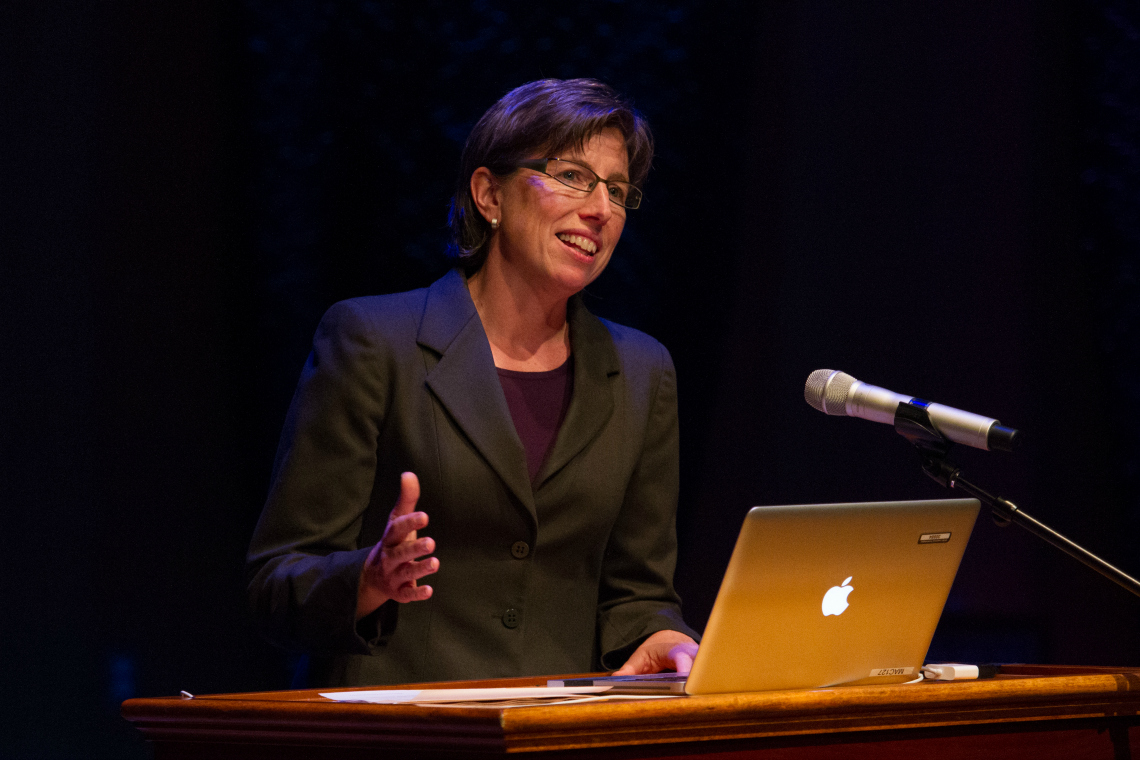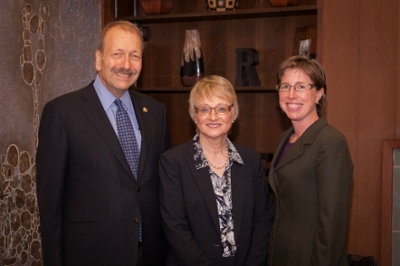“The system is failing victims,” said Elizabeth Hillman, Dean and Academic Provost of UC Hastings at a lecture she delivered at UC Santa Cruz on November 6, 2014 about the military response to sexual assault. Her address, titled “Sworn to Protect: Sexual Assault in the Military” addressed how the armed forces failed to respond to sexual assault.
“There are tragic and heartbreaking system failures,” observed Dean Hillman. She reveals how victims cope with multiple betrayals. While any sexual attack alone is devastating, victims must also deal with an abuse of the trust provided by a fellow service member and a system that will even punish them for speaking out. Dean Hillman shared how many victims deal with negative career repercussions and feared reporting crimes. The “Don’t Ask, Don’t Tell” policy became a tool for oppressing lesbians who feared being outed by their attack.
“Only 5-25% of assaults are reported,” Dean Hillman shared. She argues that data is dangerous and the military do not want people to know the gravity of the situation. She describes how assault is a “stain on our military.”
Dean Hillman contended that the reporting and prosecuting of sexaul assualt needs to be moved out of the military. She argued that prosecutors are the ones who need to make sentencing decisions, not commanding officers. There must be a change of command, she argued. Sheldon Kamieniecki, Dean of the Division of Social Sciences at UC Santa Cruz, remarked “Dean Hillman has courageously taken on a powerful group of military leaders and challenged them to correct the ways in which the armed forces address sexual assault in the military. While some positive changes have been made as a result of her writings and activity, more still needs to be done.”
Congresswoman Jackie Speier delivered a taped welcome message. Opening remarks were also given by Kelly Weisberg, who pioneered the alliance between UC Santa Cruz and UC Hastings to develop the newly launched 3+3 program and Paul Hall, president of the UC Santa Cruz Foundation Board of Trustees and a campus campaign leader.
Professor Weisberg applauded Dean Hillman’s effort. “This crisis is a clarion call for reform. Something must be done to protect those who are sworn to protect us,” said Professor Weisberg.
Hillman has tried to persuade Congress to change the way sexual assault is handled in the military. In 2013, she was appointed by Congressman Adam Smith (D-WA) to be chair of the Response Systems to Adult Sexual Assault Crimes Panel (RSP), a committee organized by the Department of Defense to review and recommend ways the military could improve the investigation, prosecution, and adjudication of crimes related to sexual assault.
In addition, Hillman played a pivotal role in ending the “Don’t Ask, Don’t Tell” policy through her leadership at the Palm Center, a think tank at UC Santa Barbara that provided the legislative advice for its repeal.
Professor Weisberg commented that Dean Hillman “has worked tirelessly to effectuate social change on the national level.” She described Dean Hillman as a crusader. Dean Hillman is a perfect speaker for our Social Justice Speaker Series. She is a leader who is driven by a desire for justice as well as by a deep sense of compassion.”
Hillman’s lecture was part of the Social Justice Speaker Series, which features UC Hastings professors giving talks at UC Santa Cruz on critical issues related to social justice. The next scheduled event in the Social Justice Speaker Series is May 14. Joel Paul will speak about legal reform of child labor in a talk titled, "Trading Up: How to Make Globalization Work for People."
This event was co-sponsored by: UC Santa Cruz Legal Studies Program, Division of Social Sciences, Institute for Humanities Research, Politics Department, Feminist Studies Department, Philosophy Department, UC Hastings College of the Law, Santa Cruz County Bar Association, Women Lawyers of Santa Cruz County, Santa Cruz County Trial Lawyers Association, Monarch Services, City of Santa Cruz Commission for Prevention of Violence Against Women, Women’s Commission of Santa Cruz County, The Diversity Center.


